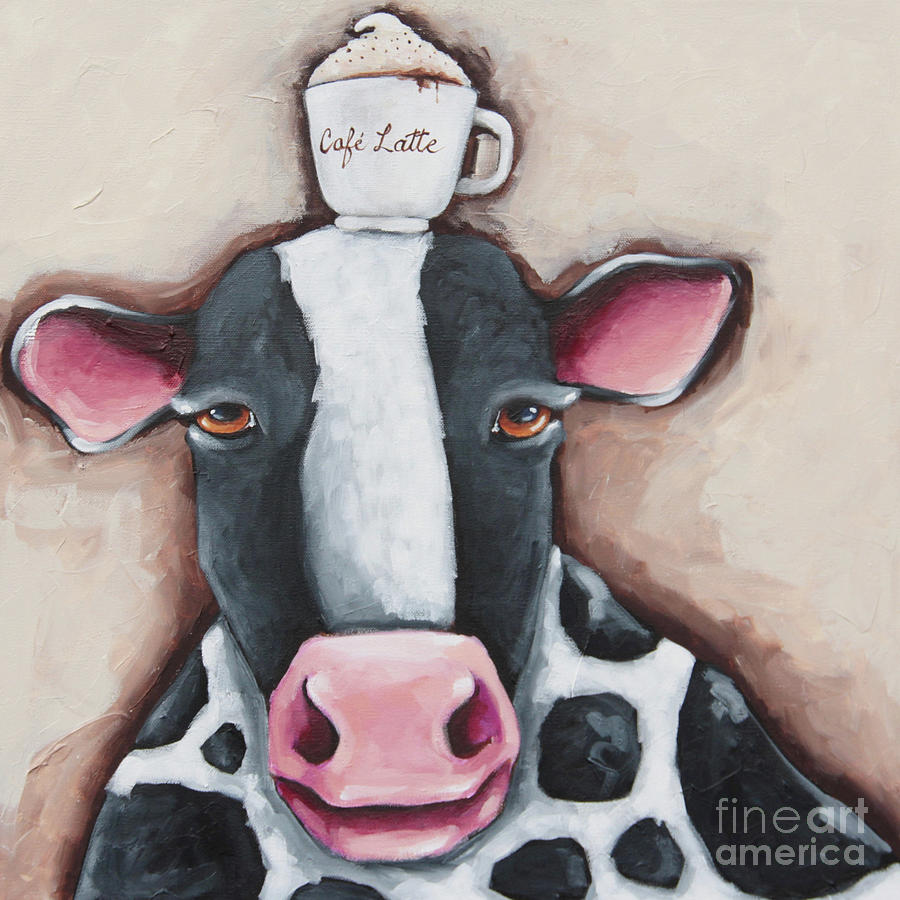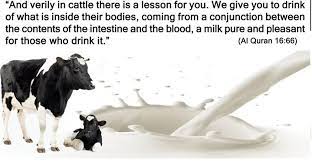We all love sipping a caffé latte on a cold rainy day with a slice of chocolate cake by the side. But have you ever wondered about the source of the latte or milk from which the coffee beverage derives its name? Does it come from the cow? Really? Let me take you on a journey of unlearning and relearning the true source of milk. Cows are one of the several domesticated cattle that are raised for milk, meat, and hides. They belong to the order Artiodactyls of the Bovidae family.[i] They feed on grass and have a huge four-chambered stomach. They forage the grass fast and keep on storing it in one of the chambers without chewing it. Later, they regurgitate and chew the grass multiple times to aid the digestion of microorganisms and plant fiber.[ii] Each chamber of their stomach works differently and is perfectly designed to break down their food and absorb nutrients.

Then these nutrients get combined with sugars from the cow’s liver to become milk. Interestingly, a study suggests that cattle can produce nutritious milk even when low-nutrient grass is being fed.[iii] Did you know that the term cow is used for females only? Males are called steer or bulls.[iv] It is impressive that cows cannot see straight very well but can see almost 360 degrees without moving their heads.[v] Cows don’t have upper front teeth and use the bottom teeth against the hard palate of their mouth to graze.[vi] The markings and spots on certain cows’ skin are like our fingerprints. Each cow has its unique pattern of black and white spots. With the diminishing dairy farms and increased demand for milk and its products in recent years, several companies began producing synthetic milk as an alternative to cow milk. Let us use synthetic milk as an analogy to understand what goes into its making and to appreciate cows and the milk we get from them. Synthetic milk is made by programming DNA with genetically engineered yeast, thus replicating the proteins found in cow’s milk. Just like regular milk, it contains casein and whey; therefore, it is difficult to differentiate between them. In 2014, two bioengineers, Perumal Gandhi and Ryan Pandya started a synthetic dairy firm called “Muufri” (Moo-free) in California, becoming the world’s first artificial cow milk inventors.[vii] A company called Perfect Day Foods claimed that the milk tasted better than plant-based milk and is an excellent alternative to cow milk.[viii] The technique is also called “precision fermentation.”

Investing in a synthetic milk-making industry can be very costly because a considerable amount of capital is required for the infrastructure that includes fermentation tanks and bioreactors.[ix] Scientists and consumers have mixed feelings about this new substitute. Some believe it to be good for the planet, while others loathe the idea of genetically modified milk as it may cause health issues among consumers. Whatever the case, instead of calling it synthetic or dairy-free milk, we should call it yeast milk. Also, the fact is that synthetic milk is not entirely synthetic because we have replaced yeast with cows. Even though synthetic milk is deemed by many as a better option for a sustainable environment, the question is, can it replace organic cow milk? Just think for a moment, how much resources, effort, and energy are required to extract DNA from the cows and make specific sequences placed inside the yeast cells? The cultured yeast is then left for a few days at the precise temperature, keeping in mind the concentration of all the components, and then a couple of days later, the yeast will produce enough milk for harvesting. Nutrients such as calcium and potassium in cow milk and flavoring agents are added later. On the other hand, cows grazing a field will return to their shelter and deliver milk that is flavorful, rich in nutrients, safe from chemical adulterations, much healthier, and comparatively cheaper than synthetic milk. Can a random motion of matter create a synthetic milk industry? If not, then how can a random accident of matter create cows? So, just as synthetic milk did not occur on its own and was made by highly educated bioengineers, do you not think that cows have a Maker too? Specialization in bioengineering is required for one to have enough knowledge to produce milk artificially.

Synthetic milk is the product of accumulated knowledge that many scientists for centuries have gathered. So, do you not wonder about the amount of knowledge required to make a cow that is living and far more sophisticated than the bioreactor machinery? Do you think scientists can make milk from scratch without using yeast or DNA information from cows? No, because they don’t possess enough knowledge and power.
On a lighter note, shouldn’t cows file a lawsuit and sue them as scientists replicate their DNA? From where did cows learn to produce milk? If milk comes from the cows, then they must be more knowledgeable than the scientists, right? It seems that cows themselves are not even the actual makers of milk. It is all about DNA which is like a recipe for making milk, just like a dish made using a detailed recipe. Then, do you think DNA can be the real source of milk?
Cows depend on the grass to survive. Like all living beings, they need air, water, food, and sunlight, proving they are connected and dependent upon them. Certain bacteria inside the four-chambered stomach that break down the food are thus indirectly reliant on the grass. The tiny cells and all cow organs are also interdependent and interconnected. So, this shows that the One (Al-Wahid) capable of creating and sustaining a cow must also be responsible for creating and sustaining the tiny bacteria and other microorganisms. Furthermore, whoever is responsible for creating a cow must also be responsible for creating the grass, air, sun, water, etc. Since everything is interconnected and operates harmoniously, it shows that the Maker of a cow is the maker of the entire universe. He must be absolutely Generous (Al-Kareem), the Most Merciful (Ar-Rahman), the Most Compassionate (Ar-Raheem), and extremely Loving (Al-Wadud), for He has provided us with such an amazing animal without charging a fee. We have learned from synthetic milk production that the cow does not actually produce cow milk; it is the DNA that contains the actual data or recipe of milk. Imagine if the chef is invisible; would it still be right to praise the recipe for an amazing dish? We would never agree if someone told us that since there is no chef visible in the kitchen, the recipe has prepared a dish for us because it is logically impossible.

Similarly, it is logical to say that an Infinite Power and Mercy of the Absolute Compassionate Being is at work who creates milk through both cows and yeast. Both cow milk coming through cows and synthetic milk prepared from cultured yeast are apparent veils; therefore, the hidden Infinite Power that is making that happen should be acknowledged. Unlike expensive machinery or gadgets that are very costly and well-maintained, we take cows for granted because they are available to us for free, as if they are valueless. Cows are indeed one of many of God’s bounties that barely gets appreciated. Cows are peaceful animals and thus teach us to have patience and stay calm. Sharing is caring, as they say, is one of the lessons we can learn from them.
Cows are given milk by the Most Merciful to feed their babies and human beings, as verse 66 from chapter 16 of the Quran suggests. So, the milk comes through the cow, not from the cow. And ever wondered what the Most Merciful and Loving wants in return for this precious gift? If there is anything He expects from us is remembrance (dhikr). But why would He want us to remember Him? Does He need our remembrance and praise? No. He wants us to recognize the true source of milk. He wants us to know that it is not the cows but Him creating the milk; thus, He alone is worthy of worship and praise. Remembering and praising Him also humble us and make us realize our powerlessness. By acknowledging the might of the Mightiest, we succumb our ego to Him and become kinder towards our fellow creatures. His remembrance leads us to ponder (fikr) upon His creation and use our critical mind to acknowledge the Ultimate Reality and bear testimony to His Oneness and Uniqueness. It helps us to know the true value of His infinite mercy manifested in the milk. It makes us realize that if scientists cannot produce milk from scratch, cows cannot make it either. Hence, we should be grateful (shukr) for everything He has given us.
References:
[i] Wikipedia contributors, "Cattle," Wikipedia, The Free Encyclopedia, https://en.wikipedia.org/w/index.php?title=Cattle&oldid=1111202714 (Accessed Sept 17, 2022). [ii] Huffman, B.. "cow." Encyclopaedia Britannica, November 26, 2019. https://www.britannica.com/animal/cow. (Accessed Sept 20, 2022). [iii] Highlights Kids, https://www.highlightskids.com/explore/science-questions/how-do-cows-produce-milk#:~:text=As%20the%20material%20moves%20through,cow's%20liver%20to%20create%20milk. (Accessed Sept 21, 2022). [iv] Hooperm, Fun Facts about Cows. (May 22, 2019). https://wp.wwu.edu/wordpresstam/2019/05/22/fun-facts-about-cows/ (Accessed Sept 20, 2022). [v] Ibid. [vi] Matt & Jessica, 27 Amazing Facts About Cows That Will Impress Your Friends. (July 14, 2022). https://www.clovermeadowsbeef.com/amazing-facts-about-cows/ (Accessed Sept 21, 2022) [vii] Bec Crew, World’s First Artificial Cow’s Milk to Hit the Market Next Year. (Oct 29, 2014). [viii] Cassie Slane, Fake milk is real news. (Feb 20, 2019). https://www.nbcnews.com/business/business-news/fake-milk-real-news-synthetic-alternatives-threaten-traditional-dairy-farms-n973236 (Accessed Sept 23, 2022). [ix] Milena Bojovic, Synthetic Milk is Coming. (Aug 29, 2022). https://www.sciencealert.com/synthetic-milk-is-coming-and-it-could-radically-shake-up-dairy (Accessed 23, Sept 2022).